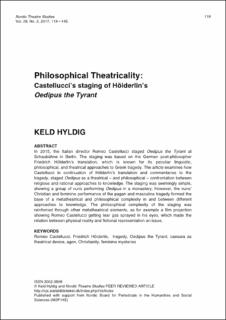Philosophical Theatricality: Castellucci’s staging of Hölderlin’s Oedipus the Tyrant
Journal article, Peer reviewed
Published version

Åpne
Permanent lenke
https://hdl.handle.net/11250/3029599Utgivelsesdato
2017Metadata
Vis full innførselSamlinger
Sammendrag
In 2015, the Italian director Romeo Castellucci staged Oedipus the Tyrant at Schaubühne in Berlin. The staging was based on the German poet-philosopher Friedrich Hölderlin’s translation, which is known for its peculiar linguistic, philosophical, and theatrical approaches to Greek tragedy. The article examines how Castellucci in continuation of Hölderlin’s translation and commentaries to the tragedy, staged Oedipus as a theatrical – and philosophical – confrontation between religious and rational approaches to knowledge. The staging was seemingly simple, showing a group of nuns performing Oedipus in a monastery. However, the nuns’ Christian and feminine performance of the pagan and masculine tragedy formed the base of a metatheatrical and philosophical complexity in and between different approaches to knowledge. The philosophical complexity of the staging was reinforced through other metatheatrical elements, as for example a film projection showing Romeo Castellucci getting tear gas sprayed in his eyes, which made the relation between physical reality and fictional representation an issue.